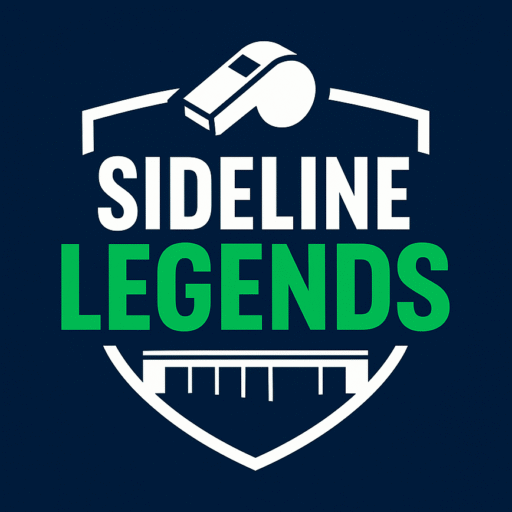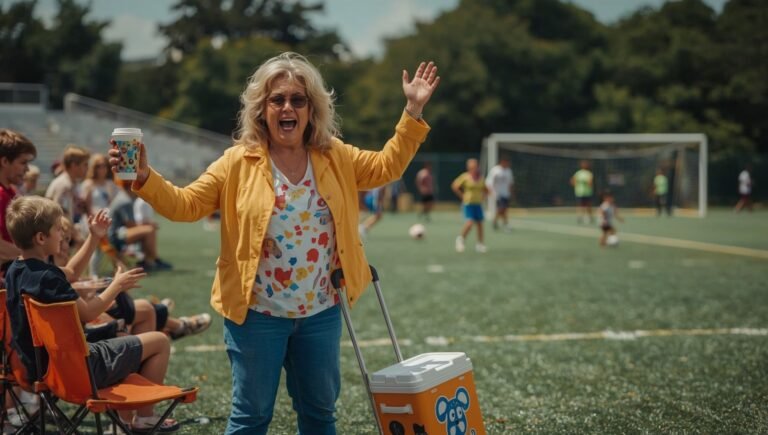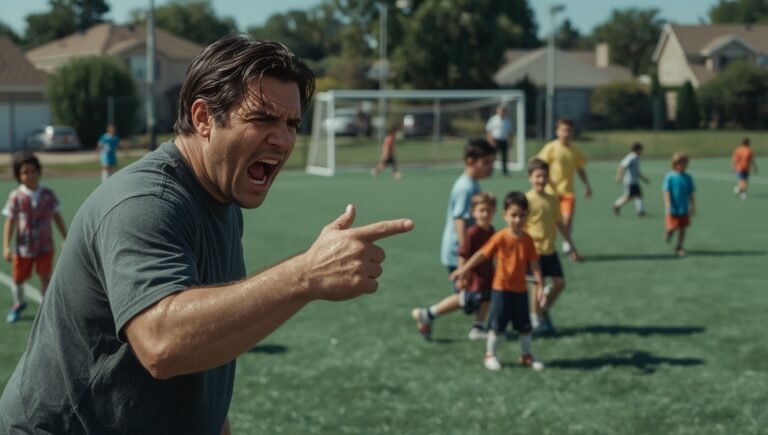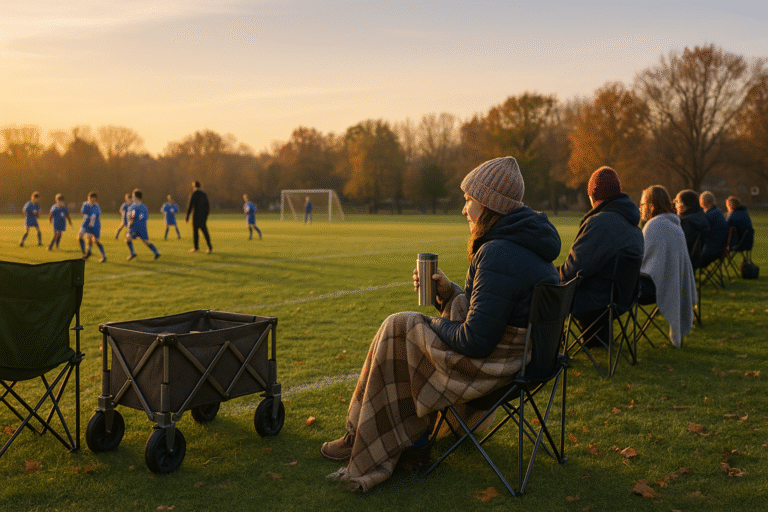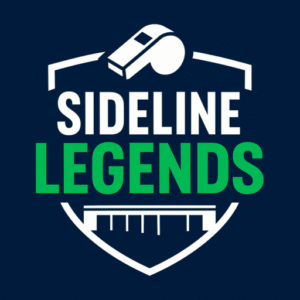The whistle blows, the game ends, and you gather up your folding chair, empty Dunkin’ cup, and the wagon full of gear that weighs more than a small car. Your kid drags themselves to the back seat, sweaty, starving, and emotionally spent. You turn the key, and here it comes: the most intense fifteen minutes of youth sports. Not overtime. Not penalty shots. The ride home.
Ask any sports psychologist and they’ll tell you the same thing. For kids, the car ride after a game is often the most stressful part of the day. Not the coach yelling. Not the refs missing obvious calls. Not even the other team running up the score. It’s you. What you say, or don’t say, in that cramped little Honda Pilot cabin sets the tone for whether your kid keeps playing or decides they’ve had enough.
According to the Aspen Institute’s Project Play, nearly 70 percent of kids quit organized sports by the age of 13. One of the biggest reasons is the pressure they feel from parents. And nowhere does that pressure show up more than in the car, when the uniform is still damp and emotions are running high.
Why the Ride Home Matters More Than the Game
When the game ends, your kid’s body is buzzing with adrenaline. Their stress hormones are already spiking. Win or lose, they’re physically exhausted and emotionally drained. This is not the moment their brain is ready for your wisdom about defensive spacing. Yet, parents often think immediate analysis helps. In reality, it just makes the back seat feel like an interrogation room.
Handled poorly, the ride home becomes an instant film session where mistakes are replayed and rehashed until your kid checks out completely. They start dreading the car ride more than the game. Handled well, the ride home becomes one of the easiest ways to build their confidence and keep them coming back.
The ride home after youth sports is not just a drive. It’s the hidden coaching session you didn’t realize you were giving.
The Short Term Fallout

You can spot it the second it happens. Kids who get the post game lecture shut down in real time. They cross their arms, stare out the window, or shove in AirPods and crank the volume. Some fake sleep. Others give one word answers and pray you run out of steam.
What should feel like a small victory, surviving another Saturday double header, turns into another source of stress. And the dread starts early. Kids who know the car ride is coming often walk onto the field already nervous. Not about the competition, but about what’s waiting in the parking lot.
The ride home should be the victory lap. Instead, for too many kids, it feels like detention.
The Long Term Consequences
Now here’s the real gut punch. If the ride home becomes a pattern, the damage lasts long after the season ends. Kids who feel judged every time they sit in the car lose confidence. They stop taking risks because they’re afraid of the commentary waiting for them. Burnout creeps in, and before long, they quit altogether.
It’s not just about quitting sports. The car stops being a safe space. Instead of laughing about practice playlists or begging for ice cream, your kid braces for impact. And that memory sticks. They begin to associate sports and sometimes even exercise itself, with stress and disappointment.
And maybe the hardest part: the relationship between you and your kid takes the hit. What could have been moments of connection turn into memories of silence, lectures, and tension.
Your words don’t just affect the next game. They shape how your kid views pressure, teamwork, and even their relationship with you for years to come.
The Biggest Mistakes Parents Make on the Ride Home

Let’s call them out because we’ve all been guilty of at least one:
The Coach’s Lecture: You break down every play like you’re John Madden calling the Super Bowl, except your kid just wants fries and quiet.
The Silent Treatment: You don’t say a word, but the vibe in the car is colder than the rink. Your kid gets the message loud and clear: “You let me down.”
The Comparison Trap: “Did you see how hard Jimmy hustled?” Yes. They saw. And now they wish they could disappear into the upholstery.
The Highlight Reel of Mistakes: You skip right over the hustle, the teamwork, or the small wins, and zero in on the one missed shot or dropped ball.
Back in My Day Rants: Your kid doesn’t care that you walked uphill both ways in snow, barefoot, carrying two bags. The only thing they hear is that they’ll never measure up.
Each of these mistakes seems small in the moment, but stack them up over time, and you’ve got a recipe for burnout, stress, and slammed bedroom doors.
What Kids Actually Want

Here’s the wild part. Fixing the ride home is so simple, parents almost don’t believe it. Surveys show that nine out of ten kids say the only thing they want to hear after a game is: “I love watching you play.”
That’s it. Six words. Not “Why didn’t you pass sooner?” Not “You should have hustled harder.” Just unconditional support.
And let’s be honest—most kids also want food, music, and a little quiet. Think less “post game debrief” and more “Uber Eats chauffeur.” If you’re really serious about making the ride home better, keep a stash of zbars or Blue Diamond Almond snack packs in the glove box. Half the tension dissolves when your kid is chewing instead of sulking.
What to Say vs What Not to Say
Here’s where things get tricky. Parents often think they’re “helping,” but what kids hear is completely different.
❌ “Why didn’t you shoot faster?”
✅ “That defense was tough, but you kept pushing. I was proud to watch you fight through it.”
❌ “If you hustled like Jimmy…”
✅ “I loved how you never gave up, even when the other team turned it up.”
❌ “You should have scored more.”
✅ “That goalie was on fire. You kept testing them — that’s effort I love to see.”
The difference isn’t complicated. One side sounds like judgment, the other side sounds like support. And support is the only thing kids actually want in that moment.
If Kids Could Leave Yelp Reviews

Picture this: your kid gets to rate your performance as a parent on the ride home. The reviews wouldn’t be pretty.
⭐️⭐️⭐️⭐️⭐️: “They stopped for Chick-fil-A, let me blast Taylor Swift, and didn’t mention my missed shots once. Best ride ever.”
⭐️⭐️⭐️: “They said ‘good game’ but reminded me Jimmy hustled more. Mixed feelings.”
⭐️: “Full lecture from the parking lot to the driveway. No food. Radio stuck on NPR. Would not recommend.”
If you’re shooting for a five star rating, the recipe is easy: snacks, music, and space.
Why Parents Fall Into the Trap
Most parents don’t set out to ruin the ride home. It comes from love or from stress. Club fees are sky high. Playing time feels political. College dreams lurk in the background. You’ve invested time, money, and weekends. Of course you want to see it pay off. But unloading those feelings on your kid in the car doesn’t make them better. It just makes them resentful.
The car is not the place to vent about the five hundred dollar tournament you just drove four hours for. It’s not the place to wonder out loud whether they’ll “make it one day.” The car is the place where they need to feel like you’re in their corner, no matter what.
If you really want to keep yourself from talking too much, buy a pair of Sony WH-CH720N noise canceling headphones. Put them on, hum along, and let your kid DJ the playlist.
The Bigger Picture
This isn’t just about soccer or lacrosse or basketball. It’s about life. How you handle the ride home teaches your kid how to bounce back from failure, how to deal with pressure, and how to keep showing up when things don’t go their way. Done right, it builds confidence that will carry them into school, friendships, and eventually jobs. Done wrong, it leaves scars that show up long after the cleats are retired.
One day, the rides home will be over. You won’t be carrying folding chairs or chasing down lost shin guards. You’ll just wish you had one more chance to sit in that car with your sweaty, hungry kid in the back seat. Don’t waste the moment by making it miserable.
Final Whistle

At the end of the day, your kid doesn’t need a coach in the car. They don’t need a scout in the car. They need a parent. Someone who claps when they fall, laughs when they miss, and celebrates the fact that they even showed up. Someone who makes the ride home a safe place, not a second battlefield.
So next time the whistle blows and you turn that key, remember: feed them, let them DJ, and say the only words that matter—I love watching you play.
If you’re looking for more sideline survival hacks, check out Kids quitting youth sports or our guide to Fall Sideline Survival Essentials. And then share this post with the parent who needs it most because we all know one.
FAQ: The ride home after youth Sports
What should I actually say after a game?
Keep it simple. The magic phrase is “I love watching you play.” It tells your child you value them for who they are, not just how they perform.
Why does the ride home feel so stressful for kids?
Because they’re still processing. Their brains are fried. Criticism in that moment feels like salt in the wound. Think about your boss showing up at your desk the second you bomb a presentation. You wouldn’t want feedback then. Neither does your kid.
When is the right time to give feedback?
Later. Ideally the next day, when emotions cool. And even then, ask first: “Want to hear my thoughts on yesterday?” If they say no, drop it. If they say yes, keep it constructive and short.
What if my kid is upset after a loss?
Don’t try to fix it. Just sit with them in it. A snack and some silence go further than a pep talk. Let them lead the conversation when they’re ready.
How do I know if my kid is burning out?
Look for signs like constant excuses to skip practice, lack of energy, or more stress than fun. If they dread every game, it’s time to reevaluate.
How do I make the ride home more fun?
Snacks, music, and laughter. Stock the car with food, let your kid run the playlist, or keep a cooler in the trunk.
